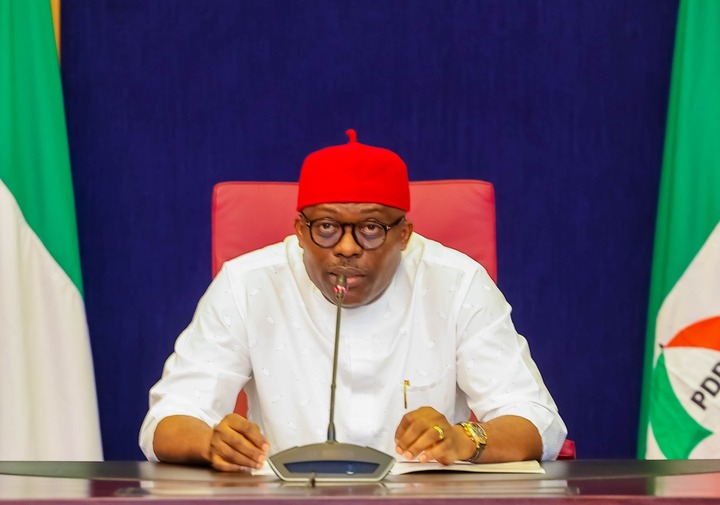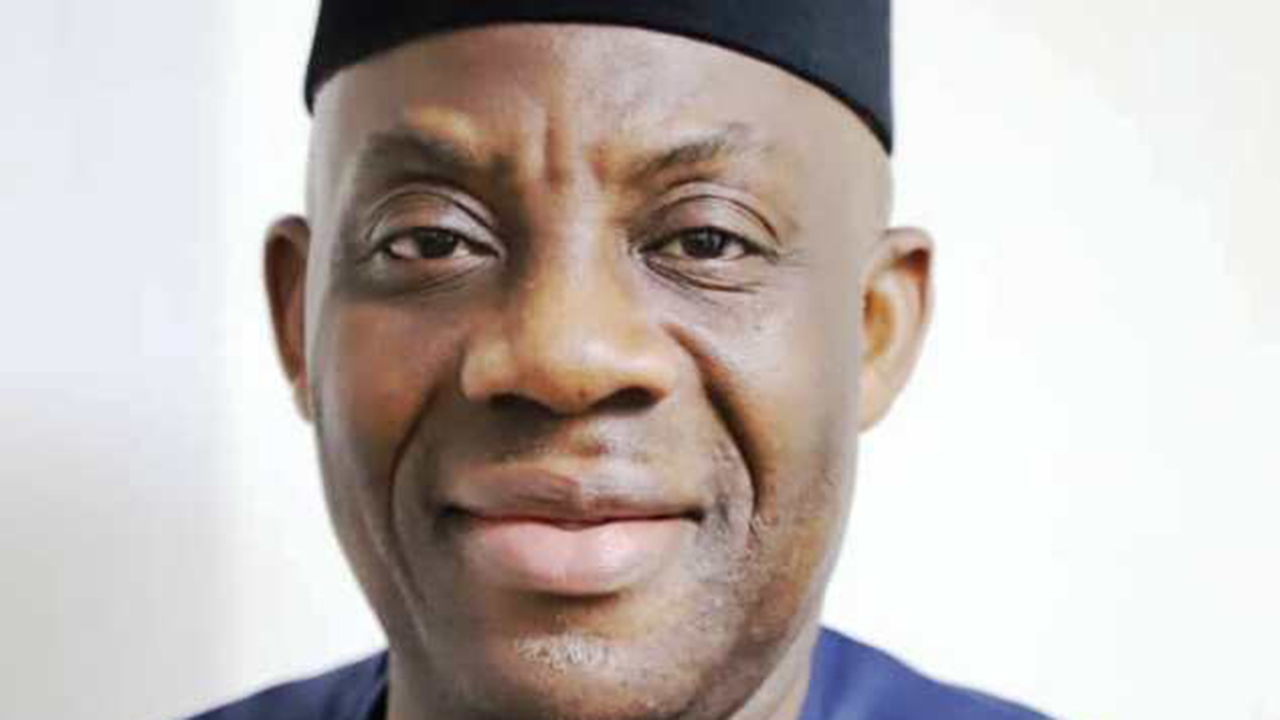An egregious act of presidential overreach, a grievous assault on classical democratic principles, and a forgiveless manipulation of the provisions of the Constitution of the Federal Republic of Nigeria, 1999 have all just unravelled before our very eyes in somnambulant or sleepwalking Rivers State.
A named ‘Sole Administrator of Rivers State’, Mr Ibok-Ete Ibas, a retired Vice-admiral was eerily appointed by President Bola Tinubu on March 18, 2025 to superintend affairs and events in Rivers State for a period of six months in the first instance. We all stood moping.
The Governor, Siminalayi Fubara, his deputy, Professor Ngozi Odu, and the members of the House of Assembly were peremptorily suspended for the same period for which the Sole Administrator was to hold sway. Iba’s rule of thumb administration waffled on for its guesstimated period ostensibly on a sea of troubles.
It was obvious it was to hold forth for a pre-planned takeover of the political reins of Rivers State by a federal government that has greedily eyed Nigeria’s biggest pot of soup in terms of its locus of oil revenue receipts and in terms of its accompanying symbolism.
An opposing political party to the one at the centre was in charge of the administrative and legislative whiplash of Rivers State. The situation was incompatible with Tinubu theology. The strong ego of the Tinubu presidency was evident to political watchers; it was palpable it would stop at nothing to, metaphorically speaking, capture Port Harcourt.
Now done after an invidious hatchet job, Tinubu announced he has lifted the ill-advised emergency rule. Fubara, his deputy, and the members of the House of Assembly have been recalled to resume their schoolboy chores and to go and sin no more.
It is a moot point that President Tinubu had no power to suspend a democratically elected governor or the members of a State House of Assembly. So, the putative lifting of the suspension of an act that never should have been contemplated or executed is otiose; it is like pronouncing a win in a football match where no goal was scored. An unconstitutional act cannot cure itself by sheer effluxion of time or by the magisterial will or pronouncement of its perpetrator.
The President’s intervention in the contrived debacle of Rivers State was uncalled for in the first place. It is viewed by observers as a rehearsed story line or script for empowering the president and his party to gain some time for plotting a scheme in the direction of subverting or emasculating Fubara, his government and the party in power in Rivers State. Even though the party had worked, through its erstwhile alter ego, Mr Nyesom Wike, for the success of the president at the 2023 polls, the president had brooded over his own declining status in Rivers State.
It will appear that Tinubu’s life-long tendency to play the political game with cant or a niche for unfairly outwitting his opponent has found a most penetrating expression in the Rivers State macabre dance. It is glaring for all to see.
As governor, Fubara had been catapulted to prominence. Plot against him ironically thickened daily from the quarters whence he was nominated and sponsored. A man of a few words, his terse remarks carried an inversely proportional magnetic vibe that riled his adversaries. Fubara had scorched the snake. Rivers State under him would not survive the destruction of orderly government which was sure to attend a reign of riot or bloodletting, which Fubara feared was being stoked by the enemy camp. His body language said that much.
His enemies were not amused even as they attached dubious importance to his opinions and remarks. Day after day, Fubara encouraged his people to ignore the ranting antics of their opponents. Fubara revealed himself as a mild reformer on some matters and an unyielding conservative on others.
His undoing was that he was much of a gentleman within the context of the murky waters or the boiling cauldron of the Nigerian political firmament. He could not move decisively against his adversaries in the manner of a Wike who would have metaphorically decimated his enemies. Each day, his streetwise opponents imposed the severest strain on him.
Their purpose was to wear him out by intimidating him or by physically marching against him. For some dreary long time, Fubara withstood the onslaught and the campaign of hate of his wild opponents. Expectedly, his party rose in his support, threatening that any unconstitutional attempt to remove him from office will meet with the ire of the people.
Similarly, a lot of literature poured forth in the media in the form of incisively critical essays wondering what end would be served by the Tinubu presidency’s flaunted judgmental or one-sided intervention. In the many meetings that ensued ostensibly called for sizing up Fubara, the engagement of his connection with the general public opposition to the dire situation in Rivers State was interrogated and found to be timid or superficial. It was not sensed to be rooted in combative denunciation or action.
One significant lesson to be drawn from this Rivers State melodrama manifesting in elite disagreement or phoney dogfights is that they are not grounded in the breadth and scope of the people’s interests and sympathies. They thereby lack the requisite people’s force and understanding. They are perceived for what they truly are; the fight for spoils among theives. They find no favour with or participation of the ordinary people.
Some hard-nosed analysts have suggested that what happened in Rivers State may only be peculiar to that part of Nigeria and may not happen in the North (especially in Kano State), in the South-west or the South-east where the intrinsic nature of the attitude to politics is identified as rooted in the exclusive concern for a continuing search for avenues for expression. The people of Rivers State appear dissociated from the facts of the experience of their State’s being or founding. The historical and sociological significance of their State’s existence is largely missed as they generally display or manifest internal incoherence or crass apathy. Even the so-called militants are ideologically nude or ignorant.
The Tinubu presidency unfairly deployed the institutions of state to frustrate the resolution of the needless crisis. It manipulatively summoned the provisions of the Constitution for taking the wind off the sail of the Rivers State political establishment. It slammed a controversial state of emergency situation on the State – suspending the Executive and Legislative arms of the government.
When the various matters arising from the imbroglio found their way to court in diverse jurisdictions, a number of unclear or conveniently-equivocal pronouncements or rulings issued forth. The Supreme Court, on its part, did not consider it justifiable to timeously attend to the matter brought before it until the state of emergency – a major subject matter of the issues – was declared to have been lifted thereby foisting on the parties or particularly the parties seeking reliefs, a fait accompli.
Fubara and his Deputy are to return as Governor and Deputy Governor without more. They are reportedly under very strict instructions to avoid a situation whereby they will insist or deign to exercise the powers of their office respecting the constitutionally-guaranteed independence of their arm of government.
The Governor may be summoned at will to answer to the whims of the Legislature. That spectacle may not be far fetched. More damning is the rumour that he may be barred from exercising his right to re-contest as Governor under another tenure. His masters seem to have had enough of him as governor.
In all of this drama, we are presented with the stark picture of a secondary school headboy whose Principal is austere, severe and whimsical. He has pronounced upon the headboy, the harshest punishment for a dimly-expressed infraction.
The poor schoolboy pleaded for mercy. Not satisfied, the Principal has referred the matter to the Chairman of the Board of Governors who is necessarily beholding to the Principal for the share of spoils of office. The indictment and the expulsion of the schoolboy is as sure as dusk. It is any fool’s guess.
How a man of good breeding and background could sully his reputation by finding himself among a band of cheap highbinders who has wrecked a polity and is continuing in its insouciant ruination of our pristine body of cherished values is beyond comprehension.
A true gentleman is enjoined to flee from all appearances of evil, no matter how gaudily they are arrayed. He is encouraged to pursue a lowly vocation with high-minded predisposition.
Rotimi-John, a lawyer and commentator on public affairs is the Deputy Secretary-General of Afenifere. He wrote via: [email protected]






